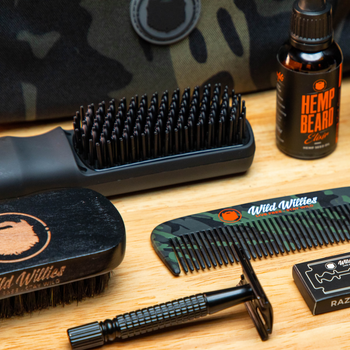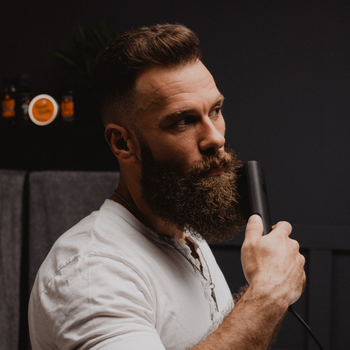Beard growth supplements are one of the most commonly used tools to aid anyone trying to grow out facial hair. Growing a beard isn't always easy for everyone, especially if genetics aren't in your favor. Still, there are methods that will help you get the job done quicker than normal with better results. If you're looking to use beard supplements, there are many things that you'll need to consider first.

Beard Growth Supplements Ensure Optimum Nutrient Intake
It is a common misconception that beard growth supplements are a magic pill. In reality, while you should consider taking a supplement, understand that your hair will not magically grow several inches overnight. The reason to take a supplement is to ensure that your body is receiving the nutrients essential to beard growth.
Most supplements will contain a mixture of vitamin A, C, D, and several B vitamins. The reason companies select these vitamins is because research suggests each is important to follicle development and healthy skin.
Many people do not think about their skin or overall health in terms of beard growth, but the skin plays a critical role in hair development. If your skin cells and pores are not functioning optimally, they will likely stifle facial hair growth, possibly leading to uncomfortable in-grown hairs and patchy growth.
How Vitamins and Minerals Contribute to Beard Growth Supplements Success
Beard growth supplements require the right mix of vitamins and minerals to do any good for a beard grower. The combination typically focuses on those vitamins and minerals that contribute the most to healthy hair.
Vitamin A
Vitamin A is a crucial component of every cell in the body, including hair — the fastest developing tissue. Beyond being an essential part of cellular makeup, vitamin A is a vital nutrient in sebum production, a naturally occurring skin and hair moisturizer.
Vitamin C
The environment, your diet, and even your morning routine can place your body in danger of absorbing numerous free radicals, which can hinder and prematurely age your hair. Vitamin C and other antioxidant-rich nutrients help reduce the oxidative stress caused by free radicals, allowing you're your hair to thrive. Vitamin C is also a rich source of collagen and helps the body absorb iron, both pertinent to healthy skin and hair development.
Vitamin D
While there is not currently enough known about the role of vitamin D in hair growth, researchers do know that low levels of the nutrient can result in alopecia or hair loss. You can consume vitamin D by eating fortified foods, fatty fish, and cod liver oil or by stepping outside for a few minutes, but a supplement is an excellent way to ensure you are getting enough.
Vitamin E
Vitamin E is another antioxidant that can prevent oxidative stress caused by free radicals. Some studies have shown the efficacy of this critical nutrient on hair growth and health.
Iron
Iron is a mineral that helps red blood cells oxygenate the body. It is necessary for several bodily functions, including hair growth. Researchers have demonstrated that iron deficiencies often result in significant hair loss.
Zinc
Zinc is another common mineral you might find in beard growth supplements because it is necessary for hair tissue repair and growth. Primarily, zinc helps maintain oil glands around the follicles, allowing for natural, healthy development.
B Vitamins and Biotin Lead the Charge in Most Supplements
While many B vitamins can contribute to hair health, biotin is the best known. There are several studies linking biotin deficiency with hair loss. While biotin is technically a B vitamin, it is sometimes referred to as vitamin H, helping to metabolize fats, carbohydrates, and proteins.
Because biotin deficiency can result in hair loss, proponents believe it can thicken or stimulate hair growth. Unfortunately, besides anecdotal evidence, there is limited scientific research into the efficacy of this vitamin.
While the evidence is thin when speaking to a direct correlation and hair growth, biotin strengthens keratin infrastructures, a vital component of healthy beard growth. As with anything else, the quality of the product matters. Supplements are not regulated in the same way as prescriptions, meaning if you want a quality product, you need to focus on purchasing from reputable businesses.

Other Ways To Promote Healthy Beard Growth
While supplements offer one effective method for invigorating your natural facial hair development, you can do so much more. Eating a healthy diet and getting plenty of exercise is one way of ensuring all of your bodily functions are performing optimally. You can also focus on reducing stress and avoiding unhealthy substances, like smoking. Finally, it would be best if you developed a skin and beard care routine.
A healthy beard needs a healthy foundation. To take care of your skin, you want to start with using an exfoliator or cleanser every day, preferably twice daily. Following the cleanse, apply a moisturizer; it is best if you use one with SPF. Then, apply beard oil and beard balm or butter. Depending on how far along you are in your beard growth, you can use a beard shampoo every other day and a conditioner every day.
Are Beard Growth Supplements Right for You?
While growing a beard often comes down to genetics and lifestyle choices, supplements can ensure you get the necessary nutrients for healthy hair growth. When combined with proper skin care and beard care routines, supplements can significantly affect your developing beard's sheen, softness, and overall quality. However, do not buy from just any company. You want to purchase your beard growth supplements and all your beard care essentials from a reputable business like Wild Willies, ensuring you are buying quality-backed products.
If you want to try beard growth supplements, try them through a brand you know and respect, a company worth thousands of positive reviews. Beard supplements are a worthwhile product for promoting natural hair growth, and if you want the best beard you can have, trust no one else but Wild Willies. Contact us if you have any questions about our supplements or other products.






